Hyundai IONIQ 6 vs Skoda Elroq – Performance, range & efficiency compared
Compare performance, boot capacity, efficiency and price at a glance.
Find out which car is the better choice for you – Hyundai IONIQ 6 or Skoda Elroq?
Here’s where it gets real: The technical differences in detail
Costs and Efficiency: Looking at overall running costs, both models reveal some interesting differences in everyday economy.
Skoda Elroq has a clearly perceptible advantage in terms of price – it starts at 29100 £, while the Hyundai IONIQ 6 costs 37600 £. That’s a price difference of around 8571 £.
In terms of energy consumption, the advantage goes to the Hyundai IONIQ 6: with 13.90 kWh per 100 km, it’s barely noticeable more efficient than the Skoda Elroq with 15.20 kWh. That’s a difference of about 1.30 kWh.
As for range, the Hyundai IONIQ 6 performs barely noticeable better – achieving up to 614 km, about 34 km more than the Skoda Elroq.
Engine and Performance: Power, torque and acceleration are the classic benchmarks for car enthusiasts – and here, some clear differences start to show.
When it comes to engine power, the Hyundai IONIQ 6 has a convincingly edge – offering 650 HP compared to 340 HP. That’s roughly 310 HP more horsepower.
In acceleration from 0 to 100 km/h, the Hyundai IONIQ 6 is significantly quicker – completing the sprint in 3.20 s, while the Skoda Elroq takes 5.40 s. That’s about 2.20 s faster.
In terms of top speed, the Hyundai IONIQ 6 performs clearly perceptible better – reaching 257 km/h, while the Skoda Elroq tops out at 180 km/h. The difference is around 77 km/h.
There’s also a difference in torque: the Hyundai IONIQ 6 pulls slightly stronger with 770 Nm compared to 679 Nm. That’s about 91 Nm difference.
Space and Everyday Use: Beyond pure performance, interior space and usability matter most in daily life. This is where you see which car is more practical and versatile.
Both vehicles offer seating for 5 people.
In curb weight, the Hyundai IONIQ 6 is hardly perceptible lighter – 1850 kg compared to 1949 kg. The difference is around 99 kg.
In terms of boot space, the Skoda Elroq offers somewhat more room – 470 L compared to 401 L. That’s a difference of about 69 L.
When it comes to payload, Skoda Elroq to a small extent takes the win – 531 kg compared to 430 kg. That’s a difference of about 101 kg.
Our conclusion: The Hyundai IONIQ 6 proves to be outperforms in nearly all aspects and thus becomes our DriveDuel Champion!
Overall, Hyundai IONIQ 6 is the better all-rounder in this comparison.
Skoda Elroq Video
Hyundai IONIQ 6
The Hyundai IONIQ 6 merges futuristic design with eco-friendly technology, offering a glimpse into the future of electric mobility. Its sleek silhouette and aerodynamic profile are sure to capture attention on the road, while the interior provides a seamless blend of comfort and cutting-edge digital features. With a focus on efficiency and sustainability, this model represents a significant step forward in the evolution of electric vehicles.
details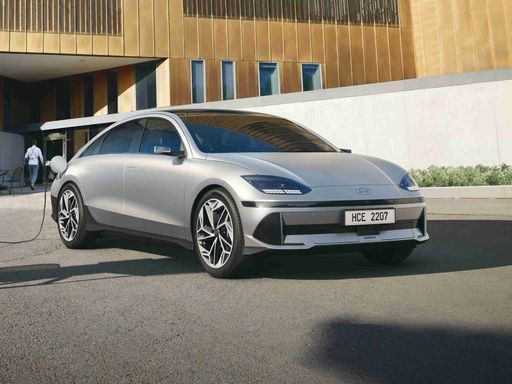 @ hyundai.news
@ hyundai.news
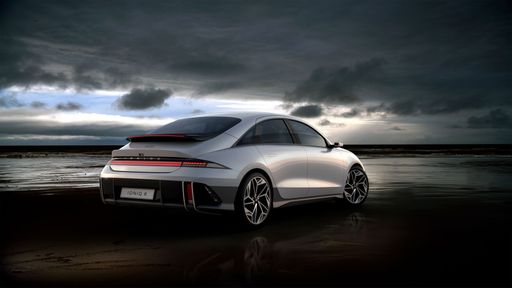 @ hyundai.news
@ hyundai.news
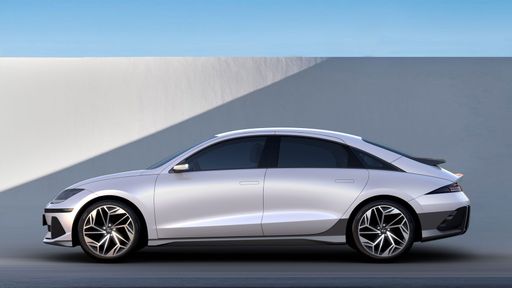 @ hyundai.news
@ hyundai.news
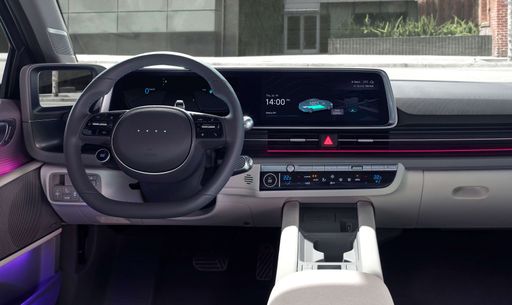 @ hyundai.news
@ hyundai.news
Skoda Elroq
The Elroq stands out in the automotive world with its striking design and a bold presence on the road. Boasting an interior that balances luxury and functionality, it provides an engaging driving experience for enthusiasts and casual drivers alike. With its innovative features and attention to detail, the Elroq redefines what consumers can expect from modern automobiles.
details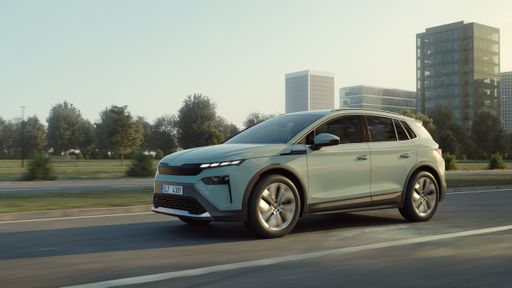 @ skoda-storyboard.com
@ skoda-storyboard.com
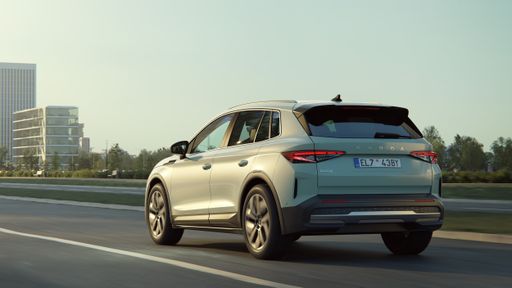 @ skoda-storyboard.com
@ skoda-storyboard.com
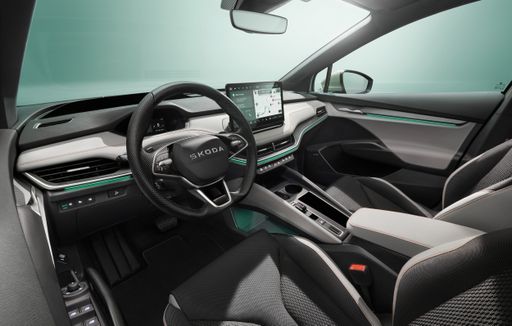 @ skoda-storyboard.com
@ skoda-storyboard.com

|

|
|
|
|
Costs and Consumption |
|
|---|---|
|
Price
37600 - 64300 £
|
Price
29100 - 45500 £
|
|
Consumption L/100km
-
|
Consumption L/100km
-
|
|
Consumption kWh/100km
13.9 - 15.1 kWh
|
Consumption kWh/100km
15.2 - 16.5 kWh
|
|
Electric Range
429 - 614 km
|
Electric Range
377 - 580 km
|
|
Battery Capacity
53 - 84 kWh
|
Battery Capacity
52 - 79 kWh
|
|
co2
0 g/km
|
co2
0 g/km
|
|
Fuel tank capacity
-
|
Fuel tank capacity
-
|
Dimensions and Body |
|
|---|---|
|
Body Type
Hatchback
|
Body Type
SUV
|
|
Seats
5
|
Seats
5
|
|
Doors
4
|
Doors
5
|
|
Curb weight
1850 - 2095 kg
|
Curb weight
1949 - 2268 kg
|
|
Trunk capacity
401 L
|
Trunk capacity
470 L
|
|
Length
4855 - 4935 mm
|
Length
4488 mm
|
|
Width
1880 - 1940 mm
|
Width
1884 mm
|
|
Height
1495 mm
|
Height
1608 - 1625 mm
|
|
Max trunk capacity
-
|
Max trunk capacity
1580 L
|
|
Payload
425 - 430 kg
|
Payload
470 - 531 kg
|
Engine and Performance |
|
|---|---|
|
Engine Type
Electric
|
Engine Type
Electric
|
|
Transmission
Automatic
|
Transmission
Automatic
|
|
Transmission Detail
Reduction Gearbox
|
Transmission Detail
Reduction Gearbox
|
|
Drive Type
Rear-Wheel Drive, All-Wheel Drive
|
Drive Type
Rear-Wheel Drive, All-Wheel Drive
|
|
Power HP
151 - 650 HP
|
Power HP
170 - 340 HP
|
|
Acceleration 0-100km/h
3.2 - 8.8 s
|
Acceleration 0-100km/h
5.4 - 9 s
|
|
Max Speed
185 - 257 km/h
|
Max Speed
160 - 180 km/h
|
|
Torque
350 - 770 Nm
|
Torque
310 - 679 Nm
|
|
Number of Cylinders
-
|
Number of Cylinders
-
|
|
Power kW
111 - 478 kW
|
Power kW
125 - 250 kW
|
|
Engine capacity
-
|
Engine capacity
-
|
General |
|
|---|---|
|
Model Year
2022 - 2025
|
Model Year
2025
|
|
CO2 Efficiency Class
A
|
CO2 Efficiency Class
A
|
|
Brand
Hyundai
|
Brand
Skoda
|
What drive types are available for the Hyundai IONIQ 6?
Available configurations include Rear-Wheel Drive or All-Wheel Drive.
The prices and data displayed are estimates based on German list prices and may vary by country. This information is not legally binding.
